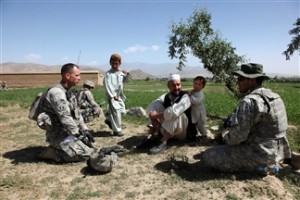The Afghanistan Endgame
Brian Katulis at the Center for American Progress and Andrew Exum at the Center for New American Security tangled this week over Afghanistan strategy. Brian said the counter-insurgency community had hoodwinked Washington, and Andrew said that the Center for American Progress hadn’t presented compelling plans for Iraq and Afghanistan. Michael Cohen prompted the kerfuffle when he argued that the left had failed to question the war in Afghanistan and propose credible alternatives.
All of which got me thinking: can the think tank community propel a smart, substance-focused public debate about America’s strategic aims in Afghanistan? I have in mind a probing, impolitic assessment of whether the current tactics can achieve that strategy. CAP invited CNAS to take part in a public debate, which Exum said he we would happily join after returning from a dissertation leave. But I’d like to see these thinkers applying their brains to the big sprawling questions. Think tanks are largely extensions of different power constituencies in Washington, so perhaps it’s naïve, or structurally impossible, to expect them to re-frame the Afghanistan debate so that it includes more than the current two options: leave, or stay and fight, with some debate over the timeline and number of troops.
I expected this kind of vigorous reappraisal in 2009, during the Obama Administration’s Afghanistan policy reviews. However, the government ended up focusing on narrow questions, like how many troops were required to execute a counter-insurgency strategy, and on what timeline American troops should withdraw. The public never heard an airing of the underlying strategic questions:
- What tactics have been most effective at killing, capturing or deterring individuals and organizations whose goal is to conduct terrorist attacks beyond Afghanistan’s borders?
- What is America’s desired end-state in Afghanistan and Pakistan? Is it achievable, especially considering Afghan President Hamid Karzai’s drift away from the U.S. and Pakistan’s internal problems?
- If not, can America disentangle itself from Afghanistan in its tenth year of war there, even without achieving its principal war aims?
- If the U.S. cannot midwife a stable Afghanistan (or Pakistan) then what is the most effective way to combat the international terrorist groups currently thriving in the borderlands of Afghanistan and Pakistan?
These questions are tough, and probing honest answers would probably require the defense and South Asia experts to jettison some of their previous conclusions and criticize the policies of some of their friends and colleagues. But it would be a healthy and illuminating discussion at a moment when the course set largely by General Stanley McChrystal’s report last fall seems not to be yielding the desired results.


